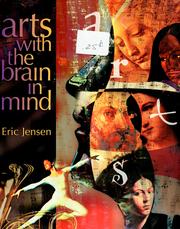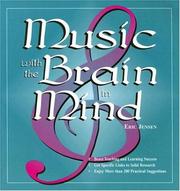| Listing 1 - 10 of 22 | << page >> |
Sort by
|

ISBN: 9786610930791 1280930799 1416600744 0871209160 0871207362 9780871207364 9780871209160 9781416600749 0871205149 9780871205148 6610930791 9781280930799 Year: 2001 Publisher: Alexandria, Va. : Association for Supervision and Curriculum Development,
Abstract | Keywords | Export | Availability | Bookmark
 Loading...
Loading...Choose an application
- Reference Manager
- EndNote
- RefWorks (Direct export to RefWorks)
"How do the arts stack up as a major discipline? What is their effect on the brain, learning, and human development? How might schools best implement and assess an arts program?" Eric Jensen answers these questions - and more - in this book. To push for higher standards of learning, many policymakers are eliminating arts programs. To Jensen, that's a mistake.This book presents the definitive case, based on what we know about the brain and learning, for making arts a core part of the basic curriculum and thoughtfully integrating them into every subject. Separate chapters address musical, visual, and kinesthetic arts in ways that reveal their influence on learning.What are the effects of a fully implemented arts program? The evidence points to the following:* Fewer dropouts* Higher attendance * Better team players * An increased love of learning* Greater student dignity * Enhanced creativity* A more prepared citizen for the workplace of tomorrow* Greater cultural awareness as a bonusTo Jensen, it's not a matter of choosing, say, the musical arts over the kinesthetic. Rather, ask what kind of art makes sense for what purposes. How much time per day? At what ages? What kind of music? What kind of movement? Should the arts be required? How do we assess arts programs? In answering these real-world questions, Jensen provides dozens of practical, detailed suggestions for incorporating the arts into every classroom.
Arts --- Cognition in children --- Curriculum planning --- Study and teaching
Book
ISBN: 1452294747 1452207224 1412963311 9781452294742 9781452207223 9781412963312 Year: 2009 Publisher: Thousand Oaks, Calif. ; London : Corwin,
Abstract | Keywords | Export | Availability | Bookmark
 Loading...
Loading...Choose an application
- Reference Manager
- EndNote
- RefWorks (Direct export to RefWorks)
The fourth edition of this book offers more than 1000 brain-friendly strategies and examines standards-based lesson planning, learning styles, and positive teaching mind-sets to enhance student results.
Teaching. --- Lesson planning. --- Teacher-student relationships.

ISBN: 1890460060 9781890460068 Year: 2000 Publisher: Thousand Oaks Corwin
Abstract | Keywords | Export | Availability | Bookmark
 Loading...
Loading...Choose an application
- Reference Manager
- EndNote
- RefWorks (Direct export to RefWorks)
Brain --- Music --- Instruction and study --- Physiological aspects --- Psychological aspects
Film
ISBN: 9781473999947 Year: 2017 Publisher: United Kingdom : SAGE Publications Ltd,
Abstract | Keywords | Export | Availability | Bookmark
 Loading...
Loading...Choose an application
- Reference Manager
- EndNote
- RefWorks (Direct export to RefWorks)
Professors Charles Laurie and Eric Jensen discuss best practices for conducting focus groups. As part of their explanation, they cover qualitative interview design, preparation and data collection methods.
Interviewing. --- Focus groups. --- Research --- Methodology.
Film
ISBN: 9781473992306 Year: 2017 Publisher: London, United Kingdom : SAGE Publications Ltd,
Abstract | Keywords | Export | Availability | Bookmark
 Loading...
Loading...Choose an application
- Reference Manager
- EndNote
- RefWorks (Direct export to RefWorks)
Dr Eric Jensen and Dr Charles Laurie discuss research design and offer tips for the process. Research design involves the creation of a road map to keep the research on track and to not get sidetracked. Jensen and Laurie discuss developing and operationalizing a research question.
Social sciences --- Research --- Methodology.
Film
ISBN: 9781473999954 Year: 2017 Publisher: United Kingdom : SAGE Publications Ltd,
Abstract | Keywords | Export | Availability | Bookmark
 Loading...
Loading...Choose an application
- Reference Manager
- EndNote
- RefWorks (Direct export to RefWorks)
Dr Charles Laurie and Dr Eric Jensen offer common-sense advice on recognizing and managing physical and mental threats during research. They recommend preparation, including planning data back-up and threat mitigation techniques.
Film
ISBN: 9781473992290 Year: 2017 Publisher: London, United Kingdom : SAGE Publications Ltd,
Abstract | Keywords | Export | Availability | Bookmark
 Loading...
Loading...Choose an application
- Reference Manager
- EndNote
- RefWorks (Direct export to RefWorks)
Dr Eric Jensen and Dr Charles Laurie discuss qualitative data analysis and how to use qualitative data analysis software. Qualitative research is open ended and relies partly on personal judgement. Jensen and Laurie discuss data collection, coding the data, and writing up the analysis.
Film
ISBN: 9781526402516 Year: 2017 Publisher: London, United Kingdom : SAGE Publications Ltd.,
Abstract | Keywords | Export | Availability | Bookmark
 Loading...
Loading...Choose an application
- Reference Manager
- EndNote
- RefWorks (Direct export to RefWorks)
A research question needs to be based on a workable research topic and be focused and answerable.
Research --- Social sciences --- Methodology.
Film
ISBN: 9781526402530 Year: 2017 Publisher: London, United Kingdom : SAGE Publications Ltd.,
Abstract | Keywords | Export | Availability | Bookmark
 Loading...
Loading...Choose an application
- Reference Manager
- EndNote
- RefWorks (Direct export to RefWorks)
This animation explains surveys as tools for research, and how to use them as effectively and accurately as possible.
Surveys. --- Social sciences --- Research --- Methodology.
Book
Abstract | Keywords | Export | Availability | Bookmark
 Loading...
Loading...Choose an application
- Reference Manager
- EndNote
- RefWorks (Direct export to RefWorks)
African American musicians --- Music --- Periodicals --- Musical mercury --- Negro music journal --- Pro Musica quarterly
| Listing 1 - 10 of 22 | << page >> |
Sort by
|

 Search
Search Feedback
Feedback About UniCat
About UniCat  Help
Help News
News